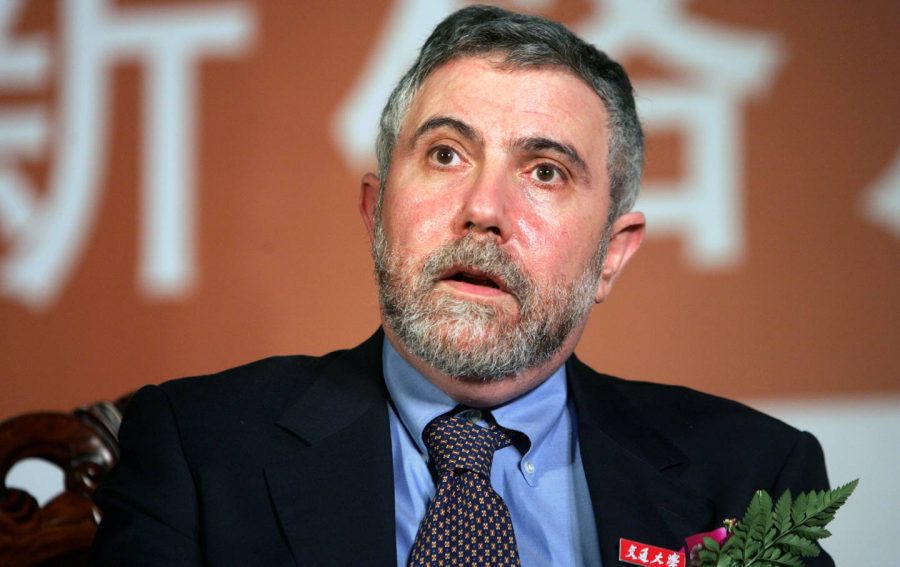Economists Urge Investors to “Avoid the Exotic Meat Market At All Costs”
March 23, 2020
As the US economy continues to tank due to Coronavirus, economists are warning investors that the rare meat industry is likely to suffer the most. “If you have any money invested in companies that sell Bamboo Bats or Palm Civets, I recommend that you sell those shares immediately,” wrote economist Paul Krugman in a New York Times Op-Ed Monday, “I just cannot imagine anybody dying to eat a potential carrier of what is now a global pandemic.” While Dow Jones is already down nearly 10,000 points in the past month, investors have largely neglected this niche culinary market. Since the beginning of February, the exotic meat index has only dropped 2 points, down from a record high 6 points in the middle of January.
News analysts are blaming this slow response on Fox News and Donald Trump, who is thought to have hundreds of thousands of shares invested in rare meat companies. In January of 2016, records also show that Trump purchased the online exotic meat retailer “buyexoticmeats.com” for a record 10 million dollars. “Because he has skin in the game, it makes sense that he would try to protect his investments,” explains Krugman, “and because he is a notoriously bad businessman, it makes sense that he has skin in this game.” Last Friday, Trump tweeted a picture of himself eating a sauteed Palm Civet in the White House dining room, while his wife Melania ate baked bat wing and his sons Donald Jr. and Barron ate from a large pile of unidentifiable raw meats. Trump captioned this tweet “Civets don’t give you Coronavirus, they give you Yummy in your Tummy!” Fox News joined the efforts to minimize concerns over these meats, publishing an article titled “The Health Benefits of Eating Raw Palm Civet Imported Directly From Wuhan, China During the Past 2 Months.” These attempts to distract consumers from the dangers of eating these meats are part of a larger operation that included Trump dressing Mike Pence up in a bat costume for his last press conference and Fox News posting a record 31 articles in one day about the dangers of not getting your daily serving of civet. “What is particularly disturbing about this situation,” says CDC Director Robert Redfield, “is that Trump does not eat these meats for the well documented cultural and spiritual reasons. Trump risks his life, and the lives of countless other people, to prevent his seventh business from going bankrupt.”
The future of many of these rare meat retailers is in jeopardy as many US cities are prohibiting citizens from visiting restaurants and bars. “10 years ago, the Civet Burger was the hottest item on our menu. Today we’re lucky to sell one or two per day, and even then we only sell them when they’re disguised as hamburgers. Now, 1000kg of raw, frozen civet meat is probably the last thing I want stored in my icebox,” explains Benjamin Woodley, the owner of 7th Ave Pub in Manhattan. 7th Ave Pub is not the only restaurant to be affected by Coronavirus, as stores all throughout the United States have reported decreased revenue in recent months. Statistics from the US Department of Agriculture show that restaurants specializing “civet, bat, tiger, bear, and alligator” dishes have lost almost 80% of business since Coronavirus was first reported in the US on January 20. As these restaurants struggle to sell even their more traditional menu items, owners have a difficult decision to make. “That guy who sold me my exotic meats…what’s his name…well I guess I never knew his name. Anyway, he really was a good guy. He certainly was dependable. The third Monday of the month at 1 a.m., without fail, he would drop off his collection. I actually only saw him once, and that was on the security camera footage. The point is, I think I’m going to have to stop doing business with him. There’s just no more demand for exotic meats anymore,” tweeted Woodley, who later went on to call the claims about pangolins as the original hosts of coronavirus “ridiculous and not based on any science or anything.”
However, not just artisanal distributors of rare meats will be affected. McDonalds, for one, is currently in the process of revising their mascot Charles the Civet after he ceased representing “a furry animal that all children loved and transformed into a monster that probably killed your grandparents,” McDonalds said in a statement. To remedy the disastrous effects that these regulations will likely have on the exotic meat industry, a coalition of rare meat suppliers is trying to sue for biased media coverage of the virus. A long-shot case, the first line of the lawsuit argues that all of the news was focused on how bats and civets were the original carriers of the disease that transmitted it to humans: “While we go out of business, profits are better than ever at Ristorante Pesto,” the first line of the claim reads. “Do you know why? Because not once did the news mention the dangers of eating Italian people. And they have more Coronavirus than my civets!”
Trump’s restrictions on foreign travel will further devastate exotic meat stock prices. Currently, 60% of rare meat imports are undocumented. However, the other 40% are thought to be smuggled in from foreign countries like Russia, China, and Afghanistan. “The first reason we believe this is that Racoon Dogs, Tibetan Antelopes, Siberian Tigers, and Striped Hyenas are in fact not found in North America. The second reason we believe this is that the FDA would never approve said animals as safe for human consumption,” explained FDA Director Stephen Hahn of the statistic. While this second point was highly contested by the FDA’s Exotic Animal Branch, their attempt to deregulate all rare animal products was unanimously overruled by the FDA’s Board of Directors at a meeting last September. Regardless, investors only foresee a downward trend in the exotic meat market, as the largest sector of their industry is cut off due to Coronavirus. “It’s possible that we will suffer from one of the largest crashes in exotic meat industry history,” warned Warren Buffet on Sunday, “the ripple effect will bring down everybody on the rare meat supply chain, from the civet herders in Wuhan to the NYC food trucks that sell civet sushi.” The New York Stock Exchange is reportedly overflowing with sell orders as brokers are panicking to dump their clients’ meat stock before it crashes to zero. For one Wall Street Banker, the message is clear: “Nobody wants to buy your damn civets.”
Historians are quick to point out that this is not the first time a pandemic has sent the food market into chaos. In 1346, the Black Death caused a historic crash in the flea and rat markets. It is estimated that the average person with shares in the Small Rodent and Insect Index lost an average of 1000 silver coins. Additionally, the Neanderthal Plague, which was first recorded 200,000 years ago, essentially eliminated the primitive economy. According to cave writings from Central Asia, the economy got so bad that “one could not even trade five rocks for a wooden stick.”
With exotic animal stock prices at record lows, some optimistic investors think this is the perfect time to invest in the market. “People originally ate raw meats as health remedies,” wrote investor Jeff O’Daniels, “So what’s to say that there won’t be an animal that cures Coronavirus?” Certain investors are citing research that eating a different Viverridae, like the African Palm Civet, could counteract the effects of eating the Asian Palm Civet and function as a medicine. While experts warn that “medicine in no way works like this,” certain people still are confident in what they call the Cancel Out Theory. “I’ve already lost all my money in my safety investments, and as of now there’s no treatment for Coronavirus. I know it’s high risk, but it’s also high reward. If this investment works out, I’ll be a millionaire,” added O’Daniels.
- Jeff O’Daniels passed away from Coronavirus on Monday after this article went to press.








judy ebby • Mar 23, 2020 at 11:17 am
This means we are at a loss as to what to serve on Thanksgiving. Everyone loved roast civic.
judy ebby • Mar 23, 2020 at 11:16 am
We are changing our Thanksgiving menu from Civets which were a great family treat.